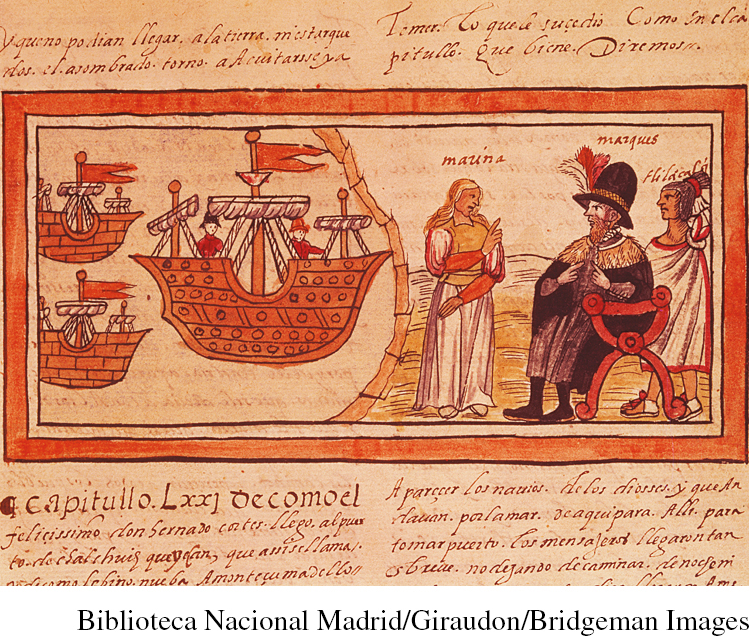ZOOMING IN: Doña Marina: Between Two Worlds

In her brief life, she was known variously as Malinal, Doña Marina, and La Malinche.4 By whatever name, she was a woman who experienced the encounter of the Old World and the New in particularly intimate ways, even as she became a bridge between them. Born around 1505, Malinal was the daughter of an elite and cultured family in the borderlands between the Maya and Aztec cultures in what is now southern Mexico. Two dramatic events decisively shaped her life. The first occurred when her father died and her mother remarried, bearing a son to her new husband. To protect this boy’s inheritance, Malinal’s family sold her into slavery. Eventually, she came into the possession of a Maya chieftain in Tabasco on the Gulf of Mexico.
Here her second life-
With a ready ear for languages and already fluent in Mayan and Nahuatl, the language of the Aztecs, Doña Marina soon picked up Spanish and quickly became indispensable to Cortés as an interpreter, cross-
More than an interpreter for Cortés, Doña Marina also became his mistress and bore him a son. But after the initial conquest of Mexico was complete and he no longer needed her skills, Cortés married Doña Marina off to another Spanish conquistador, Juan Jaramillo, with whom she lived until her death, probably around 1530. Cortés did provide her with several pieces of land, one of which, ironically, had belonged to Moctezuma. Her son, however, was taken from her and raised in Spain.
In 1523, Doña Marina performed one final service for Cortés, accompanying him on a mission to Honduras to suppress a rebellion. There her personal life seemed to come full circle, for near her hometown she encountered her mother, who had sold her into slavery, and her half brother. Díaz reported that they “were very much afraid of Doña Marina,” thinking that they would surely be put to death by their now-
In the centuries since her death, Doña Marina has been highly controversial. For much of the colonial era, she was viewed positively as an ally of the Spanish. But after independence, some came to see her as a traitor to her own people, shunning her heritage and siding with the invaders. Still others have considered her as the mother of Mexico’s mixed-
Whatever the judgments of later generations, Doña Marina herself seems to have made a clear choice to cast her lot with the Europeans. Even when Cortés had given her to another man, Doña Marina expressed no regret. According to Díaz, she declared, “Even if they were to make me mistress of all the provinces of New Spain, I would refuse the honor, for I would rather serve my husband and Cortés than anything else in the world.”
Questions: How might you define the significance of Doña Marina’s life? In what larger contexts might that life find a place?